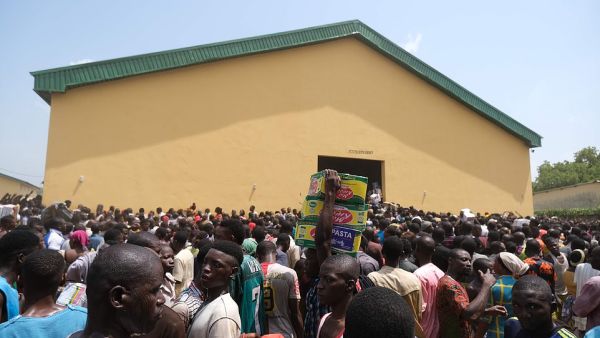Thousands of people have been filmed ransacking a food aid warehouse in Nigeria amid widespread unrest in the African country.
The warehouse, located in the city of Jos, was targeted at the weekend after angry demonstrators accused the government of 'hiding' food aid from them.
Footage shows people clambering on the roof of the warehouse, ripping off corrugated metal panels and then throwing out food sacks to the crowd.
The warehouse in Jos is just one among a string of similar buildings to be hit, with almost a third of the country's 36 states reporting raids on food aid.
Ministers say the food was intended to help those hit hard by coronavirus lockdowns, and that it was in the process of being distributed.
But amid widespread anti-government protests and in the wake of peaceful activists being shot dead as security services watched on, people were not buying it.
One person at the Jos food warehouse told France24: 'How can we have such a wicked government, where their citizens are dying of starvation and they hide these relief materials from them?
'There is hunger and starvation because there is high inflation of food prices in the market and not everyone can afford to buy due to lack of employment and poor wages and salaries.'
Another who was present during the Abuja raid on Monday added: 'We are hungry, you understand.
'There is plenty of food in this country but people are suffering. The government is cheating us by parking away this food. We are not stealing, it's our food and our right.'
According to the Nigerian government, more than half of the country's population was forced to take out loans to pay for food during lockdown earlier this year.
Meanwhile 68 per cent of households experienced moderate or severe food insecurity during August, even after the lockdown had eased.
A coalition of state governors has denied allegations of graft and said the supplies were held back as a 'strategic reserve' in case of a second wave of the virus.
But activists said that authorities needed to be more transparent.
'It's now vital that the federal and state government clarify why the palliatives had not been disbursed, investigate and prosecute anyone implicated in corruption,' said Anietie Ewang of Human Rights Watch.
Nigerian President Muhammadu Buhari on Sunday appealed for 'peace' as authorities struggled to halt the looting.
A statement from the presidency said Buhari backed a judicial inquiry in Lagos 'to give justice to peaceful protesters who lost their lives, security men who were murdered' and those who lost property in days of violence.
The leader 'appealed to the people all over the country to maintain peace and brotherhood as the machinery of the government and the wheel of justice turn against the perpetrators', it said.
Peaceful demonstrations against police brutality erupted in Nigeria on October 8 and snowballed into one of the biggest challenges to the ruling elite in decades.
Chaos spiralled after security forces on Tuesday opened fire on peaceful demonstrators in the centre of Lagos, sparking international outrage and days of rioting in Africa's biggest city.
Buhari has faced fierce criticism for failing to publicly address Tuesday's shooting of protesters, in which Amnesty International says the army and police killed 12 people.
The presidency statement said he had 'all along avoided going into a debate' over the incident 'until all the facts are established'.
The situation has calmed in economic hub Lagos after days of violence that saw official buildings torched, supermarkets looted and vehicles destroyed.
But authorities over the weekend struggled to halt a wave of looting in a number of regions as crowds defied curfew orders to ransack government warehouses.
Governors have slapped round-the-clock curfews on a string of states as residents have pillaged stocks that were meant for distribution during coronavirus lockdowns.
Locals raided agricultural supplies in the central city of Jos on Sunday a day after thousands had emptied a vast government warehouse.
Looting of food supplies was also reported in Taraba and Adamawa states.
Amnesty International says a total of 56 people have died since the demonstrations began less than three weeks ago.
The authorities have insisted that the protests were 'hijacked' by criminals but demonstrators say officials were trying to undermine their demands for change.
The presidency said 229 suspects accused of looting and destroying property were set to face prosecution in Lagos.
Nigeria is a tinderbox of deep social and economic grievances with around half of the estimated 200 million population living in extreme poverty.
Frustration runs deep among younger generations furious with the country's graft-riddled leadership over a lack of opportunities.
This article has been adapted from its original source.








